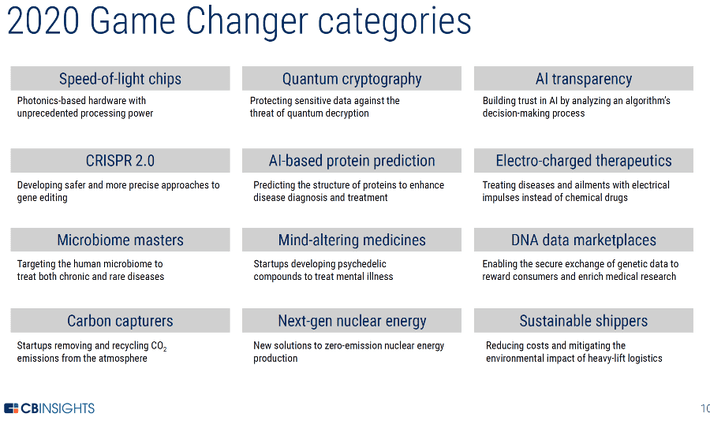Summary: Looking at the 12 hottest world-changing segments in the VC-funded world shows that AI will play a key role. Here’s a little more detail.
 From the inside of the data science profession looking out it’s easy to imagine that almost everything that is or will be important somehow depends on AI. Maybe that’s true, but how do we tell?
From the inside of the data science profession looking out it’s easy to imagine that almost everything that is or will be important somehow depends on AI. Maybe that’s true, but how do we tell?
First of all we’d have to make a list of all the tech trends that are destined to be game changers over the mid-term, say the next 5 to 15 years. Then we could examine each one for AI content and get a better idea about just how important AI is.
But how to find the most important tech trends, much less get agreement on one list versus another. Fortunately there is at least one reasonable way and that’s the time honored tradition of following the money.
In this case we mean VC investment. Let’s stipulate that at least as a group that VCs do their homework and make reasonably smart decisions. Then we’d look for fast growth areas where VCs are putting a disproportionate amount of their investment.
Fortunately someone has already done this work for us. The good folks at CBInsights conducted exactly this analysis and published their findings in a recent report called “Game Changers 2020”.
They weren’t particularly concerned about the distinction of AI or not. Their focus was on trends and companies that could change the world. In the process they also told us about the leading companies in each of their target areas so we can easily discern whether AI is a critical component.
Here’s a brief rundown of the dozen tech trends they identified as potential world-changers which on average are receiving 2.6 times as much investment as less exciting areas. 
Those with AI Critical Components
- Speed of Light Chips: Photonic based hardware with unprecedented processing power.
AI isn’t necessarily the enabler in this category so much as the customer. Using photons instead of electrons for processing allows higher bandwidth, increases in speed of 1000X, and retains MPP parallel processing. Photonic chips are useful across the whole range of computer processing but will bring greatest benefit to the increased speed and reduced cost of AI workloads.
- Quantum Cryptography: Protecting sensitive data against the threat of quantum decryption.
Creating and breaking cyphers is the meat and potatoes of AI. IBM already has over 100 clients working on its cloud-accessed quantum computer so implementation is a matter of when, not if. New high level languages are needed to perform AI in quantum environments but at its core the AI is the same as non-quantum, just with the weirdness added in.
- AI Transparency: Building trust in AI by analyzing as algorithm’s decision making process.
Some players in this area are creating new approaches to analyzing black box models while others are creating auditable platforms to meet regulatory requirements in finance and healthcare.
- AI-Based Protein Prediction: Predicting the structure of proteins to enhance disease diagnosis and treatment.
The problem of predicting or even understanding how proteins will fold has been around for a long time and the subject of many AI startups. Leaders in this group have combined advances in AI with robotic labs and other advancements to move forward with computation synthetic biology.
- Sustainable shippers: Reducing costs and mitigating the environmental impact of heavy-lift logistics.
Autonomous vehicles on land, sea, and air are in this category as are optimization platforms for creating the most efficient supply chain transport strategies.
Game Changers with No Apparent AI Component
- CRISPR 2.0 – developing safer and more precise approaches to gene editing.
- Electro-charged Therapeutics – treating ailments with electrical impulses instead of chemical drugs.
- Microbiome masters – targeting the human microbiome to treat both chronic and rare diseases.
- Mind-altering medicines – startups developing psychedelic compounds to treat mental illness.
- DNA data marketplaces – enabling the secure exchange of genetic data to reward consumers and enrich medical research.
- Carbon capturers – startups removing and recycling CO2emissions from the atmosphere.
- Next-gen nuclear energy – new solutions to zero-emission nuclear energy production.
Will AI Drive the Future?
And the answer is surprisingly 42 (Douglas Adams of Hitchhikers Guide to the Galaxy would be proud). Actually what we mean is 5 of 12 world changers or 42% rely significantly on some component of AI.
Leaving out all the high value applications of today’s AI we still have a leading role in shaping the future – at least according to CBInsights’ read of the most important startups. And if you didn’t want to be a data scientist you could always try out for one of those mind-altering psychedelic medicine companies. Me, I’ll continue to get my mellow from the math.
Other articles by Bill Vorhies
About the author: Bill is Contributing Editor for Data Science Central. Bill is also President & Chief Data Scientist at Data-Magnum and has practiced as a data scientist since 2001. His articles have been read more than 2.1 million times.
He can be reached at:
